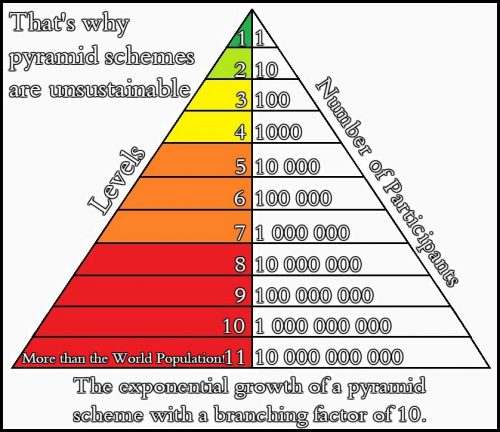 Today there are many fraudulent money making schemes. Back in the day, when the internet was just in its early stages of development (or even no internet at all), people often were unaware of scammers due to the lack of knowledge.
Today there are many fraudulent money making schemes. Back in the day, when the internet was just in its early stages of development (or even no internet at all), people often were unaware of scammers due to the lack of knowledge.
Today it’s easier for people to recognize scams and harder to perform illegal practices. Because of that, various con artists become audacious and insidious as never before.
Sometimes scams are presented in a very disguised manner. What at first sight seems to be a legitimate business, turns out to be a shameless con. Today we take a look at one of the oldest and arguably the least complex illegal scheme – the pyramid scheme.
Basic Concept
As the title implies, pyramid schemes are deceptive business models with a hierarchical structure, just like a pyramid. The whole concept is based on the recruitment of new members who must pay the initial “investment” to enter the scheme. (Sometimes there are monthly membership fees.) Those charges are paid by each “investor” to the person who recruited him or her.
It typically starts with one person who is on the top of the pyramid. For simplicity reasons, let’s say he recruits 10 people each of whom must “invest” $1000 to participate. Then those 10 participants must also get 10 new people into the scheme (in total 100 new people). Each of them is also charged with the initial amount of $1000.
Eventually, this hundred of people must also get in total 1000 of new recruits who also will have to pay $1000 each. And so on… Until the number of potential recruits becomes too low to support upper levels and the pyramid collapses.
Charges are paid to the recruiter and a person on the top can also take a percentage of these contributions. It means that early participants can actually make some profit if everything goes well.
In our case, if the member pays $1000 and gets $10 000 from his ten recruits, he makes at least $8000 (if the initiator at the top charges 10% of each contribution).
But in a scheme like this, it’s mathematically impossible to make money for all individuals without someone losing. There’s only a limited number of people (potential participants) in the world, and in order for the scheme to sustain itself, it should go on forever.
Eventually, those who lose will always be the majority at the bottom when there are not enough people willing to join. That’s the main reason why pyramid schemes are considered unethical and illegal.
Pyramid Schemes In Disguise And MLM
If only the exchange of money takes place, it’s called a naked pyramid scheme. But these are very easily spotted and terminated by authorities. So scammers came up with a more sophisticated variation of the same scheme.
These are called product-based pyramid schemes. It’s basically the same model, but when the product is involved. It’s harder to detect due to close similarities with the multi-level marketing (MLM), which is a legal business opportunity.
Legitimate multi-level marketing companies are based on recruiting salesmen to sell their products with actual value, as an alternative to the expensive marketing campaigns. Distributors get the commission for each sale. Also, each distributor has an opportunity to recruit his or her own salesmen and get commissions for their sales of actual products.
As you can see MLM companies are very similar to pyramid schemes in terms of hierarchical structure. That’s why lawyers are often having trouble determining whether the company is a legit business opportunity or an illegal pyramid scheme.
Common characteristics of honest MLM companies:
- They don’t offer money for recruitment of new people.
- Recruitment of others is optional.
- Salesmen are encouraged to focus on the actual sale of products.
- Decent amount of money can be made only by selling merchandise directly to clients outside the scheme.
- Commissions can be earned by managing a group of other distributors. The manager gets a share of every sale made by recruits, but money still comes from sales to actual customers.
- New recruits are not required to buy starter kits or a certain amount of products every month.
- Usually, don’t charge big fees for startup and membership. Or at least, have a limited free trial period (usually online companies).
- No hype and promises of getting rich fast.
- The company can provide you with all information and has nothing to hide. They can answer all your questions and answers doesn’t seem shady.
- The company has never had any problems with law enforcement. And if it did, there should be a clear explanation of why that happened.
- There is a refund policy for unsealed items.
In product-based pyramid schemes, salesmen are also recruited and they also have the opportunity to enlist others into the scheme. In fact, it’s more like an obligation than the opportunity.
Products usually have very little, if any actual value to customers and they can be difficult to sell. The best, if not the only way to make a profit, is to allure new participants and sell starter kits to them and collect various fees. Participants are often introduced with the idea, that the fastest and easiest way to make money is to get new sellers.
It often ends up with market saturation, when there are way too many people trying to sell the same overpriced and low-quality products that no one wants to buy.
Common characteristics of product-based pyramid schemes:
- Usually offer suspiciously high commissions and other benefits for the recruitment of new people.
- The recruitment of new salesmen emphasized to the point that it’s almost obligated.
- The quality and demand of products are questionable, or the price is unreasonably high. Therefore, it’s difficult to find actual clients.
- Distributors can earn commissions by managing a group of other salesmen, but money mostly comes from starter kits sold to these participants, or as some kind of “recruitment bonus.”
- Participants are required to buy a certain amount of products, despite the fact that any of the previous packages haven’t been sold.
- Usually, charge big membership and startup fees.
- Looks like they are trying to hide something. The business plan looks way too complex and unclear.
- The long history of lawsuits for unclear reasons.
- Constantly make exaggerated statements like “one in a lifetime opportunity”, “this will change your life forever”, and so on.
- Promise high returns with very little work. And it seems that the only thing they care about is to include you into the scheme.
- No free trial period or refund policy for unused products.
Basically, if a company has a free trial period, where no personal information is required, you can join without any fear. (This probably more applies to online companies, who pretends to be legal affiliate marketing businesses).
And if you are planning on joining an offline multi-level marketing company, you should always do your own research and talk to other participants (beware of shills as well).
And that’s it for now. Make sure to check out the upcoming article about the Ponzi scheme. 🙂
Feel free to comment if you have some thoughts.
Share with friends if you find it helpful!
-Grey

